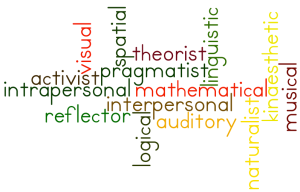 There is a storm brewing …. and it is all about learning styles…. the storm says we learn best when we follow our natural style… but on the other hand, it says that this is rubbish. So let us look at this from a sensible view point……
There is a storm brewing …. and it is all about learning styles…. the storm says we learn best when we follow our natural style… but on the other hand, it says that this is rubbish. So let us look at this from a sensible view point……
Think about the Honey and Mumford learning styles and let us imagine you are an activist; the sort of person who really likes to get stuck in and experience things, never afraid of putting themselves forward in a learning activity to give it a go. Nothing wrong with experiencing something……. it gives us a valuable opportunity to see how something "feels" and then if we reflect on it, we might just squeeze a little more learning out of it.
I recently had a conversation about CPD with someone who was "naturally" an activist – someone just like the person described above. She decided to give reflection a go – something quite alien to her and found it an absolute revelation. For years she had believed that her natural style, was one which served her well and so rarely took the opportunity to do something (like reflecting) which seemed quite unnatural to her.
This is where I think we (as a profession) have taken the learning models such as Kolb, Honey & Mumford and sometimes even the multiple intelligences theory (Howard Gardener) and have misused them. Instead of seeing them quite simply as a palette from which we can choose and blend to make a rich, colourful learning experience, we have been telling our learners it is okay to be a "pragmatist", or a "theorist" or some other equally limiting type.
What we need to be helping our learners to understand, is that the more variety in the ways that they learn, the more chances there are that the learning will stick. For example if you experience something new, don't stop there…… force yourself to reflect on it and make some notes about the learning experience. Add in some relevant theories to make sense of what you have learned and then think about how you will apply this to your real-life situations. This takes in Kolbs' and H&M's theories but rather than limiting the learners, helps them to expand their experience and have a better chance of retaining the learning.
Neuroscience tells us that by using different senses, we engage different parts of the brain making remembering easier. For example, writing, engages the motor cortex and takes pressure of the energy hungry prefrontal cortex (the higher thinking brain). So making notes can help embed learning better than just listening or watching on its own.
Some L&D professionals, as part of a learning needs analysis, will assess the learning styles of their learners, presumably with the intention of designing the learning to suit that style. In my opinion, it would be far better if they considered all the different ways we can learn and designed the learning intervention to be rich as well as varied.
So, make it visually, stimulating and have discussions about the topic, whilst incorporating emotions and benefits. Include reflection activities, theories, opportunities to create meaning and to explore the learning. Make the most of our playful and inquisitive natures by arousing curiosity to draw the learners in. Challenge the learners to go beyond what is their most comfortable, but make it a safe environment to do this is in. Most of all design learning with variety and think about how to make it memorable.
So my message is simple, as implied in the first paragraph……don't limit your learners to a style, orchestrate a rich and varied learning experience for your learners and give them opportunities to learn and imbed the learning in as many ways as possible. Make it interesting, to keep them (and you) interested!
 There is a storm brewing .... and it is all about learning styles.... the storm says we learn best when we follow our natural style... but on the other hand, it says that this is rubbish. So let us look at this from a sensible view point......
There is a storm brewing .... and it is all about learning styles.... the storm says we learn best when we follow our natural style... but on the other hand, it says that this is rubbish. So let us look at this from a sensible view point......
Think about the Honey and Mumford learning styles and let us imagine you are an activist; the sort of person who really likes to get stuck in and experience things, never afraid of putting themselves forward in a learning activity to give it a go. Nothing wrong with experiencing something....... it gives us a valuable opportunity to see how something "feels" and then if we reflect on it, we might just squeeze a little more learning out of it.
I recently had a conversation about CPD with someone who was "naturally" an activist - someone just like the person described above. She decided to give reflection a go - something quite alien to her and found it an absolute revelation. For years she had believed that her natural style, was one which served her well and so rarely took the opportunity to do something (like reflecting) which seemed quite unnatural to her.
This is where I think we (as a profession) have taken the learning models such as Kolb, Honey & Mumford and sometimes even the multiple intelligences theory (Howard Gardener) and have misused them. Instead of seeing them quite simply as a palette from which we can choose and blend to make a rich, colourful learning experience, we have been telling our learners it is okay to be a "pragmatist", or a "theorist" or some other equally limiting type.
What we need to be helping our learners to understand, is that the more variety in the ways that they learn, the more chances there are that the learning will stick. For example if you experience something new, don't stop there...... force yourself to reflect on it and make some notes about the learning experience. Add in some relevant theories to make sense of what you have learned and then think about how you will apply this to your real-life situations. This takes in Kolbs' and H&M's theories but rather than limiting the learners, helps them to expand their experience and have a better chance of retaining the learning.
Neuroscience tells us that by using different senses, we engage different parts of the brain making remembering easier. For example, writing, engages the motor cortex and takes pressure of the energy hungry prefrontal cortex (the higher thinking brain). So making notes can help embed learning better than just listening or watching on its own.
Some L&D professionals, as part of a learning needs analysis, will assess the learning styles of their learners, presumably with the intention of designing the learning to suit that style. In my opinion, it would be far better if they considered all the different ways we can learn and designed the learning intervention to be rich as well as varied.
So, make it visually, stimulating and have discussions about the topic, whilst incorporating emotions and benefits. Include reflection activities, theories, opportunities to create meaning and to explore the learning. Make the most of our playful and inquisitive natures by arousing curiosity to draw the learners in. Challenge the learners to go beyond what is their most comfortable, but make it a safe environment to do this is in. Most of all design learning with variety and think about how to make it memorable.
So my message is simple, as implied in the first paragraph......don't limit your learners to a style, orchestrate a rich and varied learning experience for your learners and give them opportunities to learn and imbed the learning in as many ways as possible. Make it interesting, to keep them (and you) interested!






2 Responses
I think our general education
I think our general education programs are far from ideal. When I was a girl I wanted to be a scientists but in our school program and in college were many needless subjects. All this maths, history, writings, tons of essays, so I had to hire professional writer. as far as I remember it was Smart custom writing – an essay writing company. It seems to me it would be much better to concentrate our education on something more useful.
I think it has everything to
I think it has everything to do with wanting to learn. As simple as this, you can try really hard, but as long as you don’t actually want to achieve success, nothing is going to work out. Remember your education at school, you can justify yourself turning to Essay Services Review as long as you want, but when you are ready to take all responsibility of diligent education, you will do the job everything by yourself. But I agree that learners can get lost, therefore there are teachers and educators who can guide them along the way.